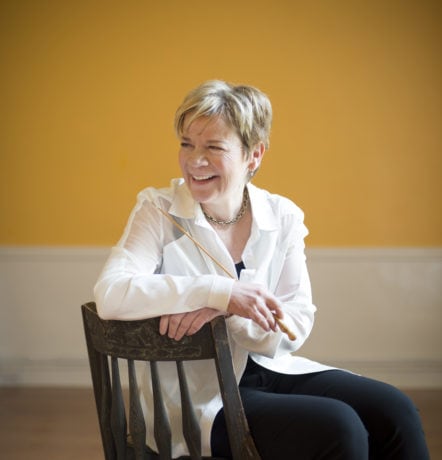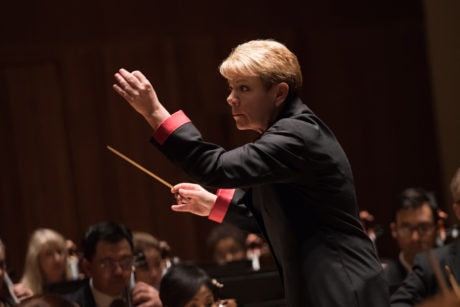Marin Alsop thinks we’re ready for a “new normal” in classical music. That is why the Baltimore Symphony Orchestra’s music director has commissioned a work by a renowned composer who happens to be a woman, featuring two conductors, also both women, simultaneously leading one orchestra and two choirs in a work about two nineteenth-century women from two different continents.

“I think it will be entertaining,” Alsop laughed in an interview with DC Theater Arts, speaking about Across the Line of Dreams: Harriet Tubman & Rani Lakshmibai.
British composer Roxanna Panufnik, whose signature sound features world music inspirations held within the structures of traditional Western classical music, wrote the work. It will have its world premiere on Thursday, March 14 at the Strathmore Music Center in North Bethesda.
Once she had the BSO’s front office behind her, Alsop commissioned the work that also leverages the BSO’s relationship with the University of Maryland Choir, directed by Edward Maclary. Alsop said the Polish-Brit composer Panufnik’s previous choral works impressed her, making her the right choice for a piece that would celebrate unsung women heroes – literally. “This piece is really about their voices, with [two] choirs representing these two women,” Alsop said.
Tubman was born into slavery on Maryland’s Eastern Shore and was a principal conductor of the Underground Railroad, moving at least 70 fugitive slaves northward before the Civil War. She also served as a Union spy during the war. Lakshmibai was the young, widowed ruler of today’s Uttar Pradesh province in India. In 1857, when the British tried to annex her province, she led a mutiny against the crown, dying in battle after several notable victories.
The two historical female heroes will be twinned at the podium by Alsop and the Italian Maestra Valentina Peleggi, who together will share the orchestra and get one choir apiece. Panufnik wrote it that way, per Alsop: “It’s so unusual to have one woman conductor, wouldn’t it be fantastic to have two women conductors?”
Peleggi is the former associate conductor of the Sao Paulo Symphony Orchestra under Alsop, who, in addition to her role with the BSO, has served as that organization’s “conductor of honor” for the past eight years. Peleggi currently leads the English National Orchestra as its Mackerras fellow.
Alsop is confident her musicians will go for the two-for-one downbeats. “They like a lot of action,” Alsop said of her musicians. “The more distraction, the better for them.”
The March debut of Panufnik’s roughly 18-minute piece is part of the BSO’s celebration of Women’s History Month, which also includes three performances of John Adams’ Scheherezade.2, a work written for and performed by Grammy-nominated violinist Leila Josefowicz. The heroine in Adams’ musical telling of the tale taken from One Thousand and One Nights neither submits to nor begs her abusive captor for her freedom, but fights him for it instead. The show run opens at Joseph Meyerhoff Symphony Hall in Baltimore on March 8, International Women’s Day, with a Strathmore performance on March 9th.
Maestra Alsop said the two shows offer DC metro region audiences a taste of what’s to come in the BSO’s 2019 – 2020 season, which leans heavily on works composed and performed by women, chosen in part to celebrate the centennial of women’s suffrage in America. Highlights include guest appearances by several women soloists such as the up-and-coming mezzo-soprano J’Nai Bridges, and Jennifer Holliday of Dream Girls fame. Three female conductors, including Xian Zhang leading George Li in Mozart’s Piano Concerto No. 23 are on the roster, as are five women composers including Anna Clyne, whom Alsop and the BSO have commissioned to write a piece that will be performed in juxtaposition with Fanny Mendelssohn’s Overture in C Major.

In celebration of the 250th anniversary of Beethoven’s birth, Alsop herself will lead a modern-day remix of his Symphony No. 9, featuring spoken word artist Wordsmith and his take on the Ode to Joy’s themes of unity, justice, and empowerment.
Such diversity is what Alsop said she intends to help make a central part of all artistic programming. As an example of what can happen when there are lapses in inclusivity, Alsop cites another upcoming BSO performance at the Strathmore in April, a concert performance of Gershwin’s Porgy and Bess. This American classic did not play at the Metropolitan Opera House in New York until 1985, roughly 50 years after the composer’s death, because it wasn’t until then that they could meet his stipulation for an all-black cast.
“A norm can only be established with some degree of consistency,” Alsop said. “I am hopeful that the focus on issues of equality and diversity will become embedded as part of the philosophy for all institutions. But I am also vigilant because I have been in this business for 40 years and this is the first time we’re talking about this ‘new normal’.”
For more information about the Baltimore Symphony Orchestra’s current season, which runs through June and ends with a live performance of Bernstein’s score to West Side Story accompanied by a showing of the film, and to learn more about its 2019-2020 season at the Strathmore Music Center in North Bethesda, visit www.bsomusic.org.




